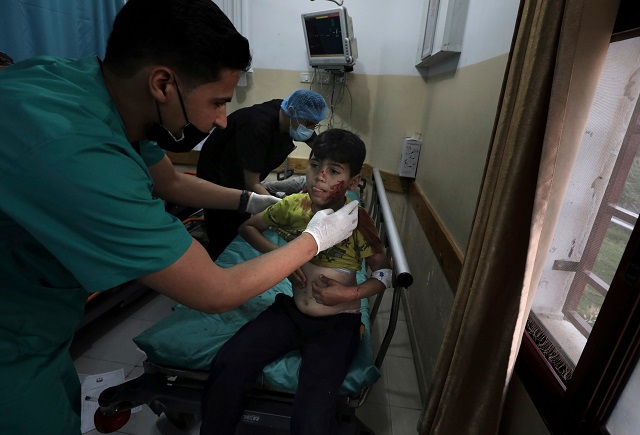The UK government should stop putting arms sales ahead of the lives of Palestinians Comment
New in Ceasefire, Politics - Posted on Tuesday, May 11, 2021 16:54 - 0 Comments

Gaza, May 11, 2021 —Israeli airstrikes in Gaza killed at least 24 Palestinians including 9 children. (Source: AJ Plus)
Built in 705 BC, Al Aqsa Mosque is the third holiest site in Islam and where it is believed that the Prophet Muhammad instructed Muslims to pray towards before he was directed to turn them to the Kaaba in Mecca. Over the course of the Muslim holy month of Ramadan, which ends this week, Palestinians have been punished by severe restrictions and state violence culminating in police brutality and violent attacks by Israeli nationalist settlers chanting “death to Arabs.” Amidst the clashes, Israeli forces attacked worshippers with stun grenades, blocking access to the steps near the Damascus Gate in Jerusalem – a tradition for those observing the month of fasting.
An Israeli court ruling that was due on Monday would have resulted in dozens of Palestinians being evicted from their homes in the Sheikh Jarrah neighbourhood of East Jerusalem, making families homeless and giving these homes to Israeli settlers in violation of International law. That same day, Israeli nationalists were planning a triumphalist march through the Muslim neighbourhood, celebrating Israel’s occupation of Jerusalem in 1967.
The provocations saw hundreds of Palestinians protesting against the continued occupation and the flagrant human rights abuses that are so central to it. In the appalling scenes that followed, hundreds of protesters and worshippers were shot at and assaulted by Israeli forces, many using tear gas and steel-coated rubber bullets. It was calculated brutality, with human rights monitors and reporters confirming cases of Palestinians who have lost eyes as a result of the attacks, and several with severe head injuries.
Tensions will only have been further escalated by the horrific airstrikes that took place on blockaded Gaza last night (Monday 10th May). It is too early to know the full human cost, but early reports indicate that at least 24 people have been killed so far, including nine children. There will be little if any international consequences for these killings. The UN has characterised the broader situation as “a pervasive crisis of accountability,” arguing out that there is “no effective remedy for the vast majority of alleged violations of international law, to ensure justice for the victims and to prevent future violations.”
It is also too early to know if UK-made arms are implicated in the strikes. But, if they are, it would certainly not be the first time. A review by the UK government at the time found that 12 licences for arms which are likely to have been used in Operation Protective Edge in 2014, a brutal month-long bombardment that killed 2000 Palestinians and, according to a UN report, sent “almost all of the population into destitution.” Likewise, in 2010 then-British Foreign Secretary David Miliband said that UK-made arms had “almost certainly” been used in the 2009 bombing campaign (Operation Cast Lead).
None of this has done anything to dent arms sales, with the UK having licensed the sale of over £400 million worth of military equipment in the last five years alone, including drones, small arms, ammunition and drone components.
This long-standing military support is underpinned by a deep well of uncritical political support. Unfortunately this support is only likely to deepen in the years ahead, with the UK and Israeli governments focused on establishing a post-Brexit free trade zone. There is no doubt that arms companies will be among the beneficiaries of this relationship, with the two governments having recently signed a military cooperation agreement to strengthen ties.
The biggest of these companies is Elbit Systems, which produces many of the drones used by Israeli forces, including the Hermes drone which, it says, provide the “backbone” of the IDF. Elbit may be an Israeli company, but it and its offshoots have offices around the world, including here in the UK. It also enjoys a strong presence in terms of UK contracts, as one of the main contractors for the UK Ministry of Defence’s Watchkeeper drone programme and in providing drones for UK ‘border security’ in the government’s campaign to demonise refugees crossing the Channel.
Regardless of how many atrocities have been inflicted, Downing Street has continued to arm and support Israeli forces. UK-made arms have been used against Palestinians before, and it is likely that they will be again. These arms sales do not just provide military support, they also send a clear sign of political support for the daily abuse and violence that is central to upholding the occupation.
But it’s not just violence and military strength that enables the occupation, it is also the silence and complicity of governments around the world who have treated Palestinian rights and lives as expendable. Many governments have been implicated in this, and that is why it is crucial that we hold ours to account.
There must be justice if there is to be peace. And all governments have a role to play in that. Here in the UK, successive governments of all political colours have talked about the need for a so-called ‘peace process’ while putting arms sales ahead of the rights and lives of Palestinians. That long and shameful policy must stop.
This weekend, activists across the UK will be taking action, including a planned demonstration this Saturday, for further details follow the Palestine Solidarity Campaign. Join us and help end the arms trade: click here to set up a regular donation to CAAT. CAAT and Mwatana for Human Rights have been nominated for the 2021 Nobel Peace Prize: find out more about what this means for our campaigning here.


Leave a Reply